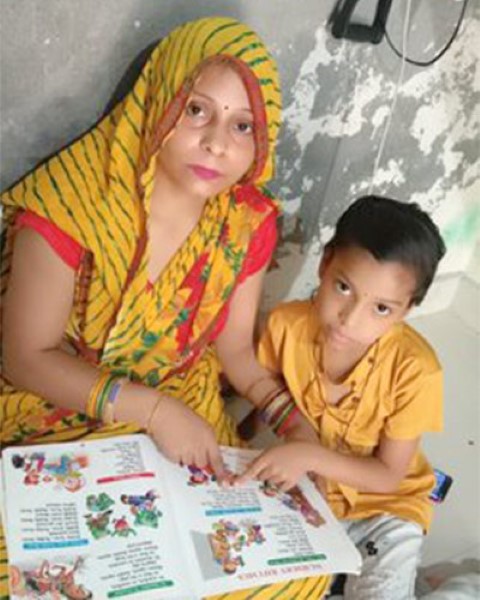- Thought Leadership

The bad news is that Lovely, like so many other disadvantaged children across the globe, was falling behind in school.
Laxmi, Lovely’s mom, became increasingly worried. Pandemic-related school closures across India meant her 7-year-old daughter may have been safer from contracting the virus, but it also meant Lovely wasn’t exposed to the continuous learning she needed to maintain her grades.
Lovely’s situation is not uncommon. Vulnerable groups — such as children living in slum clusters like those in Delhi, India — are highly susceptible to compromised education services, especially in the past few years. Income loss, lack of technology and the limited internet access all negatively affect a child’s ability to stay in school.
At Children International’s Learning Resource Center (LRC) in Delhi, staff realized the children desperately needed additional support. Renu, a library facilitator at the center, says that after ongoing COVID-19 restrictions, “children are facing learning gaps without regular input from their schools.”
Laxmi enrolled Lovely in virtual tutoring sessions offered through the LRC. The sessions help children engage in continuous learning while improving their reading and writing skills. Children learn various concepts through videos, group activities and online assignments, which motivate the children to continue their educations even during such a difficult time.
Lovely enjoyed her online sessions and agrees that they are helping her understand her schoolwork.


Laxmi is thrilled with her daughter’s progress. “I have noticed many positive changes in Lovely,” she says. “After she started attending the tutoring sessions, she gradually transformed into a studious girl. Now she has developed an interest in her studies and can read, write, and do mathematical calculations easily. Even her schoolteacher noticed the change, praising her efforts in her studies.”
Through its funding of Children International’s Learning Resource Center, the Guru Krupa Foundation continues to enrich the lives of children in India by providing opportunities for learning even during a global pandemic.
Another tutoring participant, Madvh, 11, agrees. “The sessions are helping me a lot because they cover all the topics from my school curriculum. I am performing well in school, and because of these tutoring sessions, I am able to achieve good marks.”



Our latest data shows that at least 88% of CI’s global tutoring program participants, like those from Delhi, above, increased their proficiencies in math and literacy.
Parents of children enrolled in the ECCD program were given digital preschool program content, including videos, audio lessons and worksheets. Children without digital access were provided with paper worksheets to complete at home.
Because sponsored families were facing a severe economic crisis due to lockdowns, nutrition supplies were also provided to program participants. Together, the pre-school activities, educational materials and nutrition supplements helped the children maintain their developmental progress.
For disadvantaged children like Lovely and Madvh, falling too far behind their classmates can make it nearly impossible for them to catch up. Because of sponsorship and supporter funding of our education programs, children who start (or fall) behind their peers have the interventions they need to successfully progress on their path out of poverty.

Comments
You must be logged in to comment. If you have an account, click here to log in.